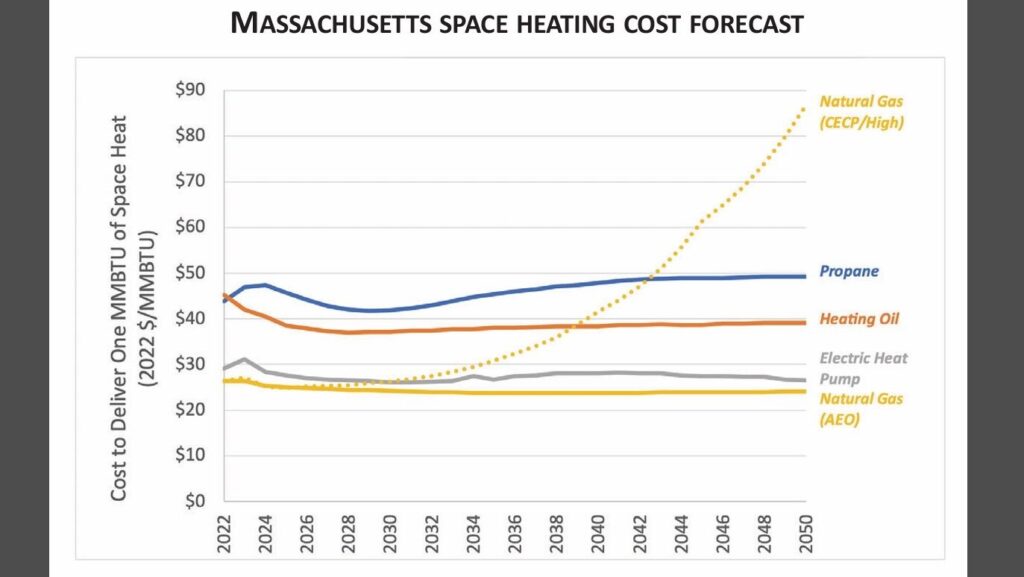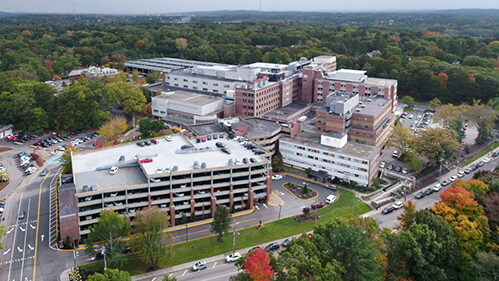smokestack
The BERDO brouhaha beats onward, and the Zoning and Planning Committee on Monday night voted to approve it without greenhouse gas reduction mandates for residential buildings (yet) and without a complete exemption for Newton-Wellesley Hospital.
BERDO is an acronym for Building Emissions Reduction and Disclosure Ordinance, and it’s a locally imposed mandate for buildings to report energy use and emissions and also reduce emissions. Boston has a BERDO in place already.
Newton’s City Council unanimously passed a resolution two years ago to adopt a BERDO, and various boards, commissions and experts have discussed how that BERDO should look ever since.
While climate change is largely exacerbated by vehicles and transportation, it’s estimated that about a third of the state’s carbon emissions come from buildings.
In Newton, non-residential large buildings account for nearly a quarter of the city’s greenhouse gas emissions.
The options
Residential buildings had not been part of the original plan, but committee member Vicki Danberg recently requested large ones be added.
So, there were three BERDO options for the committee to consider:
- Large non-residential buildings would be required to comply.
- All buildings, including residential buildings, with more than 20,000 square feet of floor space would have to comply.
- Large residential buildings would be required to comply with the energy use reporting portion of the plan and not the emissions reduction part.
That last option, Chair Lisle Baker clarified, would make those residential buildings’ energy consumption data available “so that a baseline of information can be obtained in case a decision would be made later to add large residential buildings into the ordinance for compliance.”
Baker noted that before the meeting, he took a straw poll among the committee members to see if there was enough support to add large residential buildings to BERDO—and there was—but they wanted to get public input before making a decision to recommend anything to the full City Council.
That compromise option would win out in the end, after three hours of discussion and debate.
The back-and-forth
Jim Pransky, a condo owner in Chestnut Hill, said technology isn’t advanced enough to make HVAC and energy conversions cheap, and that BERDO could lead to rent increases and condo fee increases for people who live on fixed incomes.
“Even the town of Brookline, as liberal as they are, did not apply this to residential buildings,” Pransky said.
Pransky brought back-up, too. John Breckner, facilities director at The Towers of Chestnut Hill—the condo complex in which Pransky lives—spoke next about changes that complex has already made for energy efficiency.
“We’ve done lighting, we’ve done water conservation, we’ve also done upgrades to our energy management systems, so we currently have our own state-of-the-art energy management—new motors, controls, etc.—all to reduce our consumption,” Breckner said.
The Towers also does energy co-generation, which is the creation of heat and electric power from a single source.
Breckner suggested city councilors visit all of the large residential properties in the city before making a decision on whether to include them in a BERDO.
“Trying to upgrade this building at this time, with the current technology, would be virtually impossible and cost-prohibitive,” he continued. “But in the future, who knows what technology will bring?”
His suggestion was met with a thunderous applause from an unusually packed City Council Chamber.
Peter Barrer of Newton Highlands, who was involved in researching costs associated with a BERDO, said the technology is available to do it and new technologies are coming to the market within months. But he noted there are still unknowns with cost.
“It’s hard to know exactly right now—because the technology is so new and contractors aren’t used to it—how much it’ll actually cost to convert a building,” Barrer said. “You also have to add in the cost of the electrical upgrade from the utility.”
Barrer said he favored the option to collect data from residential buildings but not require conversion and emissions reductions yet.
Former City Councilor Deb Crossley, a longtime proponent of BERDO, urged the committee to move something forward rather than further delay the ordinance.
“If you wind up from this meeting feeling as though more information needs to be sought, then I would urge you to pass the ordinance now for commercial properties,” Crossley said. “I have a longstanding respect and admiration for Peter Barrer, who I think just offered a wonderful compromise.”
Crossley said getting large residential properties to report use now would allow City Hall staff to work on possible reductions schedules for them later.
Jan Saglio of Newtonville said she managed century-old school buildings in Boston, and those buildings had no problem complying with Boston’s BERDO.
“When we went to put air conditioning in a 1914 old convent building that houses our middle school, there was very little additional cost to using the heat pumps for heat as well as cooling,” Saglio said. “I think with enough lead time, there are lots of opportunities to bring down your carbon footprint and comply with some of these larger buildings.”
Dante Capasso of Capasso Realty, which operates multiple apartment complexes and commercial properties in Newton, cautioned that imposing a BERDO on the city would have major financial impacts on residents, business owners and the city as a whole.
“No matter what way you slice and dice this, this will be a tectonic shift and increase living costs in this city significantly,” Capasso said, adding that he is already raising rents on his properties in anticipation of millions of dollars in renovations in the coming years.
“No matter how many times we say the words ‘incentive’ or ‘capital planning,’ this is the single largest governmental way to increase housing costs that I know my family has seen in almost 60 years of operating in Newton,” he said.
There were a bunch of speakers, and you can listen to them all here.

Newton Wellesley Hospital
While Newton’s BERDO has been developed, representatives from Newton-Wellesley Hospital have asked for an exemption due to its needs as a medical facility.
Newton-Wellesley Hospital has hundreds of thousands of square feet of space, nearly 300 beds and more than 3,700 employees.
John Meserve, representing the hospital, clarified that the hospital’s existing energy conversion plan is in compliance with the proposed BERDO.
“We have been offered the opportunity for an exemption if we electrify the hospital, which means no gas,” Meserve said.
But federal regulations require hospitals to have a secondary energy source, and that has to be natural gas.
The hospital’s infrastructure runs on steam boilers that get up to 250 degrees, beyond the temperature range of heat pumps.
“We have done an engineering study, and 30 percent of our existing load on the steam boilers can be replaced by heat pumps, but 70 percent of the load on those heat pumps will remain until there is an alternative to natural gas,” Meserve explained.
Ferguson said the proposed BERDO doesn’t require electrification (although there is an electrification ordinance coming, which excludes the hospital) and the BERDO would allow the hospital to keep gas as a secondary energy source and stay in compliance with the federal government.
But when it comes to greenhouse gas emissions, Meserve said, allowing the secondary source of energy doesn’t protect the hospital from fines and other penalties if the hospital goes over its emissions allowance set by the BERDO while using gas.
“That is our primary concern, exposure to penalties,” Meserve said, adding that last weekend the hospital lost electricity, which happens frequently because that hospital is fed by overhead wires.
Andrew Lee of the Newton Law Department noted, however, that the BERDO’s hardship allowance lets the city adjust emission standards and target dates on a case-by-case basis.

The way forward
In a straw poll, half of the committee approved an amendment into the BERDO to exclude Newton-Wellesley Hospital from it. The other half wanted to move the BERDO forward as written and let the hospital go through the city’s established exemption process.
The option to include large residential buildings in the reporting part of BERDO but not the emissions reduction part won out.
Newton Sustainability Co-Director Bill Ferguson said the public input has been helpful and that he wants to see BERDO move forward rather than face delay over part of it.
“I think the key at this point for us to implement a BERDO ordinance is we need to get to the implementation phase,” he said. “We need to have some version of BERDO passed soon.”
The committee heeded that call, with members on both sides of the BERDO debate agreeing that the compromise was the most practical way forward.
“When I first ran for office in 2013, it was because climate change kept me up at night and I have two small kids, and I do see it as a real threat to our community,” Councilor Alison Leary said, adding that she was open to the compromise option to get the ordinance moving forward.
Baker offered a motion to move the ordinance—as written, without a total exemption for the hospital and including residential properties for energy reporting only, forward to the full City Council.
That motion passed, and the ordinance moves forward approved by the committee.
Councilors Lisle Baker, Vicki Danberg, Rena Getz, John Oliver and Pam Wright voted to approve. No one voted to oppose it, but councilors Susan Albright, David Kalis and Joshua Krintzman abstained.
The full City Council could vote on the BERDO as early as Monday, when it’s scheduled to meet next.